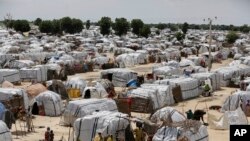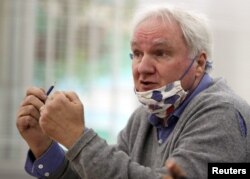The United Nations in Nigeria said more than $1 billion is needed to help millions of people in the country's troubled northeast. The U.N. said a million of those people are living in areas that are cut off due to insecurity.
Nigeria has been closing northeastern camps for internally displaced people and urging them to return home, despite ongoing threats from Islamist militants.
The launch of the U.N.’s 2022 humanitarian response plan for Nigeria was held in Abuja Wednesday.
U.N. Nigeria humanitarian coordinator Matthias Schmale said $1.1 billion is needed to reach some five and a half million people who are in need of aid in the northeast this year.
The U.N. official said over 2.2 million people remain displaced due to recurring attacks in the region and that one million are in areas designated as "hard to reach" or inaccessible to aid workers.
"By definition, we're not close to those people, that's what hard to reach means, so we're ringing the alarm bell," said Matthias Schmale, UN Humanitarian Coordinator. "Out of the million people in hard-to-reach areas, 700,000 are in acute need. And we will try and do our best to expand but it's really linked to security and access."
Those areas are still largely controlled by armed militant groups, including Boko Haram, who have been waging a war in the northeastern states of Borno, Adamawa and Yobe for twelve years.
The U.N. says hundreds of thousands of people including women and children have been killed and millions reduced to deplorable living standards.
Officials said the coronavirus pandemic and rising prices for food have further exacerbated conditions for millions of vulnerable people.
Trond Jensen, who heads Nigerian operations for the U.N. Office for Coordination of Humanitarian Affairs, says the new response plan will target the most vulnerable people first.
According to Jensen,"The plan is the result of the unwavering commitment by all those involved to ensure that life-saving assistance gets to where it is needed most and also to protect the most vulnerable people."
Since late last year, Nigerian authorities have been urging displaced people to return home and closing camps under the caveat of improved security despite threats of attacks by Boko Haram." Jensen said.
In December, Amnesty International said at least six people were killed and 14 others injured during attacks at resettlement camps.
But authorities also cited the need for residents to return to their farms in order to avert famine and reduce dependence on outside aid.
The United States ambassador to Nigeria, Marybeth Leonard, said plans are underway to evaluate high-risk areas and provide support before resettling displaced people.
“We're so eager to partner with the state authorities to make sure that … we have collaborative, consultative, principled decisions about where it is appropriate for people to go, when we can get them there and how we can support them," Leonard said
Last year the United Nations assisted nearly five million people in Nigeria, including 1.3 million who needed nutritional support.





